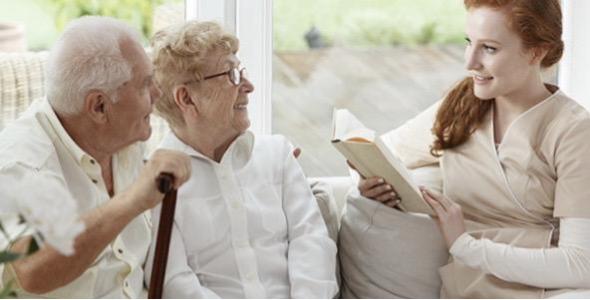Life After the First Fall: How to Plan if Your Aging Parent Has Fallen

Life After the First Fall: How Covina Families Can Plan if Your Aging Parent Has Fallen
The first time an aging parent or loved one falls is terrifying. Even if your parent is lucky enough to survive the incident without serious injury, everything feels shaken. You realize how real Mom’s age and decline have become. She no longer feels like she can trust their own body or the ground beneath her. She worries daily about simple things, like moving around the house. Because 55 percent of falls happen inside the home , with an additional 23 percent outside but near the home, the threat of falling can feel overwhelming and unavoidable. Furthermore, falling is the most prominent warning sign of further falls to come—after falling once, you’re twice as likely to fall again .
Physical injuries are a serious peril when it comes to falls. Falls are risk factors for fractures, concussions, broken hips and more. According to the Centers for Disease Control and Prevention:
- One in four seniors falls each year
- One in five falls leads to a severe injury
- 2.8 million seniors visit emergency rooms each year for injuries sustained in falls, and roughly 800,000 are hospitalized
- Upwards of 95% of fractured hips result from falls
- Traumatic brain injuries are most frequently caused by falls
Falls are a mental affliction, too. Fewer than half of seniors who fall tell their doctor . And even one fall—much less multiple—often make seniors anxious or fearful about continuing about their daily tasks, which can then lead to increased isolation and a diminished sense of self-reliance and safety, even at home.
1. First Fall is Serious
Given the fact that one fall doubles the chance of another fall, the best time to take the issue head-on is immediately following that first incident. This may sound straightforward, but it's a mentally and emotionally stressful time for the senior and family caregivers, and it can be easy to dismiss the severity of the incident or to think it was just a one-time occurrence.
2. Know the Common Reasons Falls Happen
Understanding the factors to the incident can help to comprehend it and move forward with prevention. To consider:
- Weakness, particularly in the lower body
- Medications that may cause dizziness
- Poor eyesight
- Dehydration
- Low blood pressure
- Poor balance
- Clutter, tripping hazards (like throw rugs), uneven surfaces and poor lighting
- Shuffling when walking
- Loss of flexibility
- Alcohol consumption
- Hearing loss
- Poorly fitting footwear
- Lack of calcium and vitamin D in diet
3. Get a Professional Caregiver Trained in Fall Prevention
Professional Caregivers, like the trained staff at Visiting Angels Glendora can bring an expert eye to a home to help eliminate falling hazards like those listed above—and to help ensure that your loved one is taking their prescribed medication correctly, exercising, etc. Seniors are often more receptive to lifestyle change suggestions from outside pros than from friends and family, seeing it more as expert advice than criticism. In addition to providing a safety assessment of the home, a professional caregiver’s regular visits can serve as reminders for activity—and in a worst-case scenario, another set of eyes checking in on your loved one.
4. Encourage Exercises That Improve Balance and Strength
Muscle weakness is the number one risk factor for falls , and balance and strengthening exercises are a simple and essential part of fall prevention. Check with a doctor or physical therapist before beginning any exercise program, but some great starting exercises to build strength, balance and flexibility include:
- Standing tall with heels, hips, shoulders and head against the wall for a minute or two helps with posture and balance.
- Standing tall (shoulders over hips over heels) with hands holding onto a countertop and lifting one knee at a time and then the other, as many times as possible, for two minutes. Once comfortable with this, lift and hold a knee for up to 30 seconds, repeating with the other leg
- Walking in a straight line (use the lines of hardwood floors or tile to help) for a few steps forward, working up to greater distances and including walking backward
- Purchasing a small pedal to sit in a chair and pedal for 10 minutes per day
5. Mental and Emotional Strain of Falling
Fear of falling again is a common and often debilitating after-effect of a fall. Seniors begin avoiding walking (or holding onto walls for balance and looking at their feet) and any activity, both in the home and in social settings. This only exacerbates the risk factors for falls: Muscles get weaker, balance and flexibility rapidly decrease, and they can experience extreme loneliness and listlessness, emotional factors that make it significantly harder for them to be motivated to make improvements like exercise.
Validating their experience—and the resulting fear—is an essential step. Let them know you understand how scary it must be. Once they feel heard, find fun ways to encourage activity. Even if it’s 10 steps across the kitchen, every little bit helps. Physically, as well as mentally.
Discover 10 critical safety tips to fall-proof your loved one’s home by clicking here .
If your loved one has fallen or if you are worried about them falling Visiting Angels can do a free in home visit and point out trip hazards in the home. This is one of those times where its better to be safe then sorry.
Visiting Angels Glendora help and our amazing caregivers help keep your family safe. We serve the Foothill communities and have cared for Glendora, San Dimas, Monrovia and the rest of San Gabriel Valley compassionately for 20 years. We are experts in helping keep your loved ones active and happy and we would love to help. 626-852-3302 | www.VisitingAngels.com/Glendora.
